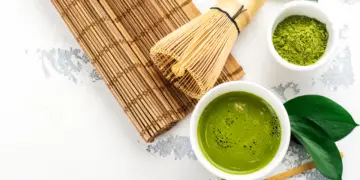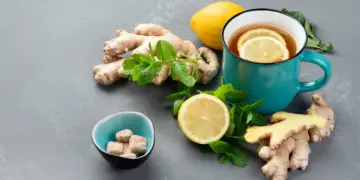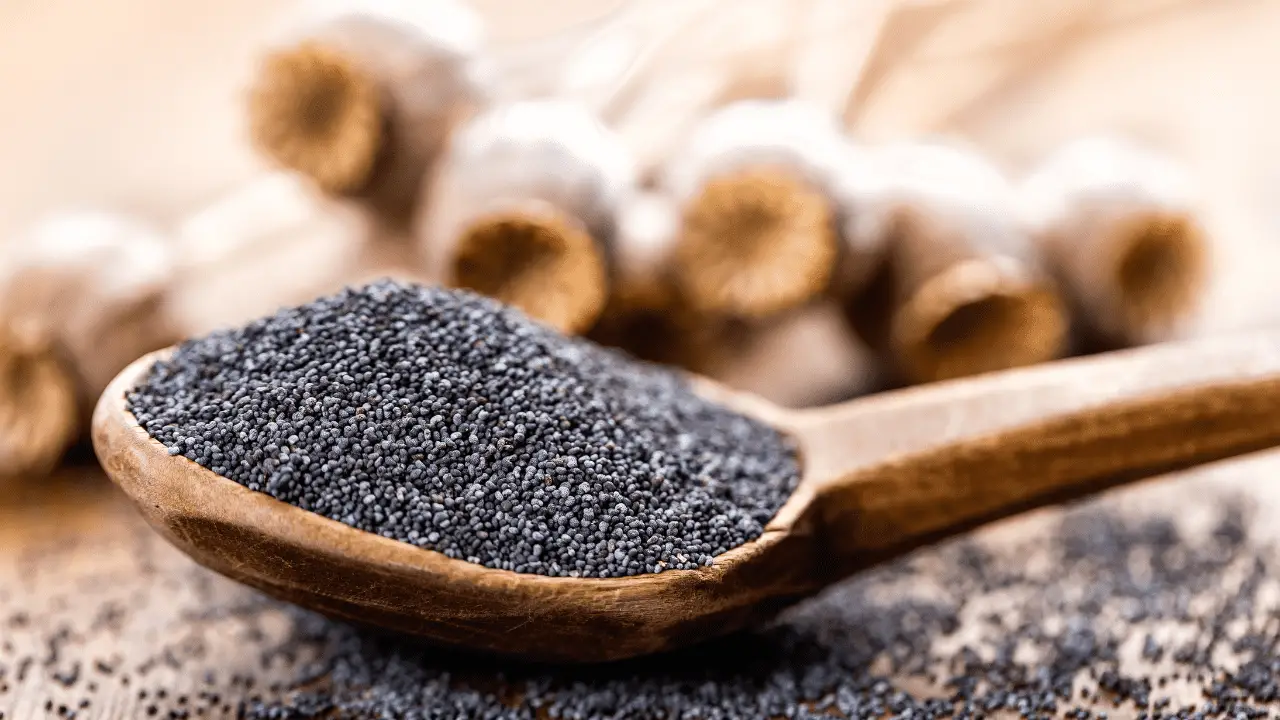
Many people out there struggle with constipation. While the most common causes are a lack of fiber and/or fluid in your diet, lack of physical activity, and/or sudden changes in your routine, some of us battle constipation regularly despite our best efforts to adhere to a normal, motility-friendly regimen. If you find yourself struggling to achieve bowel regularity despite efforts to up your fiber/fluid intake and physical activity level, there may be another solution. We will evaluate the best teas for constipation to help you determine if adding one of these teas could be the solution you’ve been looking for.
Which teas are touted as being good for constipation?
- Senna tea
- Chamomile tea
- Ginger tea
- Dandelion tea
- Green tea
- Peppermint tea
- Cascara tea
Let’s take a closer look at the ingredients in these teas to determine whether or not they live up to the hype.
Senna tea
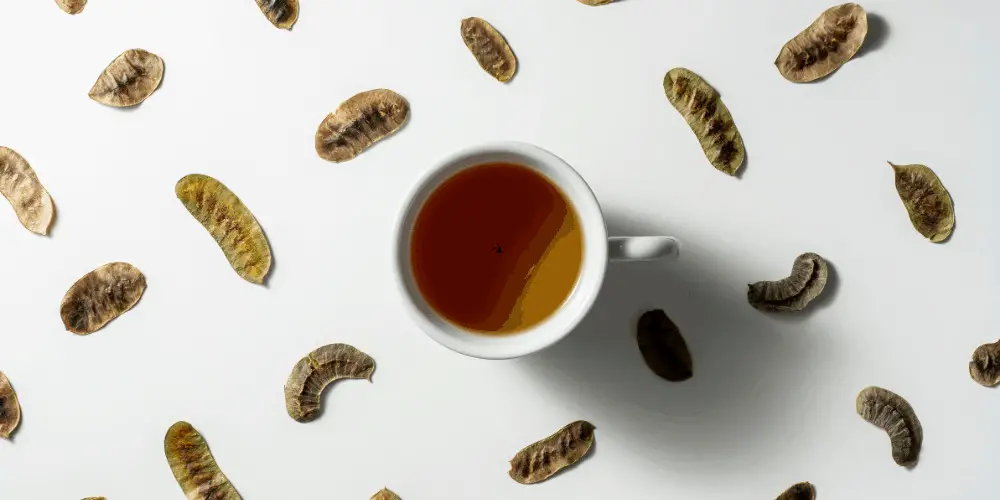
This is an herbal tea that is made from the leaves of the Cassia acutifolia (or “senna”) plant. Senna tea is often touted for its impact on constipation; it has a laxative effect, stimulating increased peristalsis within the intestines to help move things along. Smooth Move® a commercial senna-based tea that has been shown to increase the frequency of bowel movements in elderly nursing home residents suffering from constipation.
Although senna tea is considered safe in moderate amounts for anyone over 12 years of age, it may cause liver failure in those with impaired kidney function when consumed in excess. Other potential side effects include stomach cramps, nausea, and diarrhea. Senna tea is not meant for regular consumption and shouldn’t be consumed for greater than 7 consecutive days. Senna is not recommended for consumption during pregnancy or while breastfeeding and may negatively interact with a variety of medications; we recommend that you consult with your doctor or dietitian before adding this to your regimen. Senna tea tends to have a bitter flavor; adding honey or another of your favorite flavoring agents may help make it a little more palatable.
Chamomile tea

Known for its relaxing properties, chamomile tea has a similar effect on your GI tract. It may help combat constipation by relaxing the muscles of the intestines when consumed after a meal or at the end of the day.
Additionally, chamomile tea may be beneficial in reducing symptoms of heartburn and indigestion and controlling other unpleasant gastrointestinal symptoms such as excessive flatulence, nausea, and severe diarrhea. Its high antioxidant concentration offers additional benefits in the form of disease prevention and immunity regulation.
Chamomile tea is considered safe for consumption in moderate amounts; when consumed in excess, potential side effects include drowsiness and vomiting. Additionally, caution should be taken by anyone with an allergy to plants in the daisy family as chamomile may potentially trigger a reaction. In general, consuming anywhere between one to four cups of chamomile tea per day is considered safe.
Ginger tea
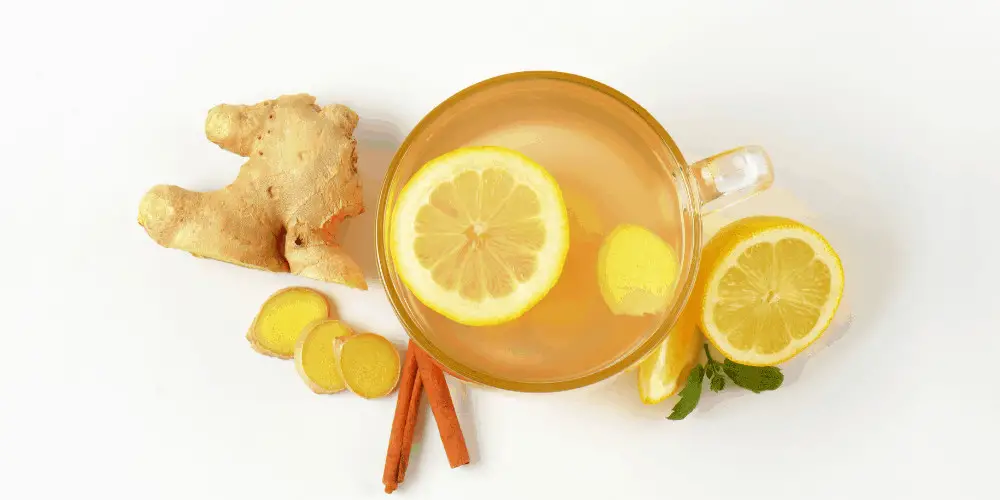
Made from ginger root, ginger tea is widely known for its positive impact on the digestive tract, particularly related to its anti-nausea effects. This particular tea seems to have a wide range of benefits, extending to and beyond the gastrointestinal tract. It is used by many to help alleviate irritation within the GI tract and improve overall digestion, including treating symptoms of bloating, gas, nausea, and constipation. Consuming moderate amounts of ginger tea (less than or equal to 4 cups per day) is unlikely to yield any unpleasant side effects.
Green tea
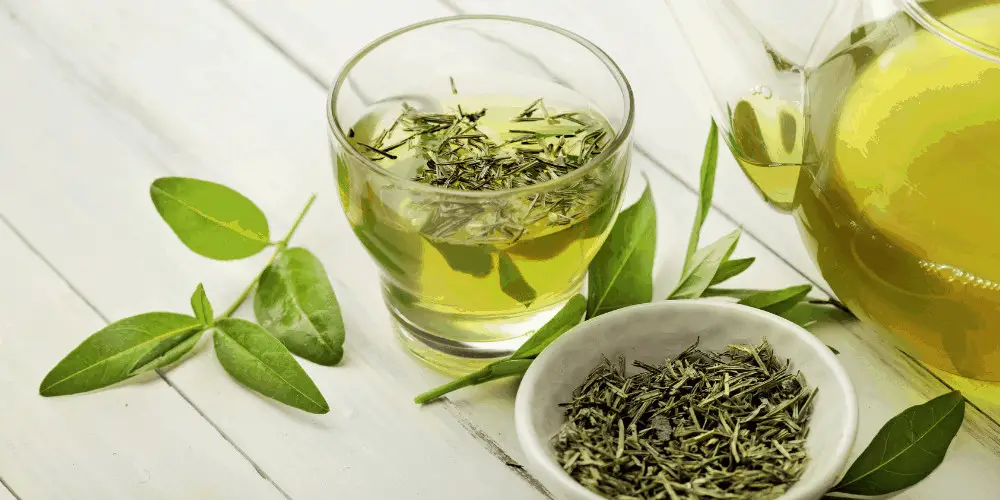
Green tea is one of the most commonly consumed beverages in the world and for good reason as it contains a variety of health benefits. Among these benefits is the potential ability to help ease your constipation. An animal study from 2016 suggested that strictinin, a phenolic compound which is commonly found in green teas, has a laxative effect that can help prevent and treat constipation. Additionally, green tea contains caffeine, which further increases its laxative effect.
Similarly to the other teas, we have reviewed, green tea is also safe when consumed in moderate amounts; however, those that are sensitive to caffeine should utilize caution as even moderate consumption may result in unpleasant side effects such as rapid heart rate or feeling anxious.
Dandelion tea
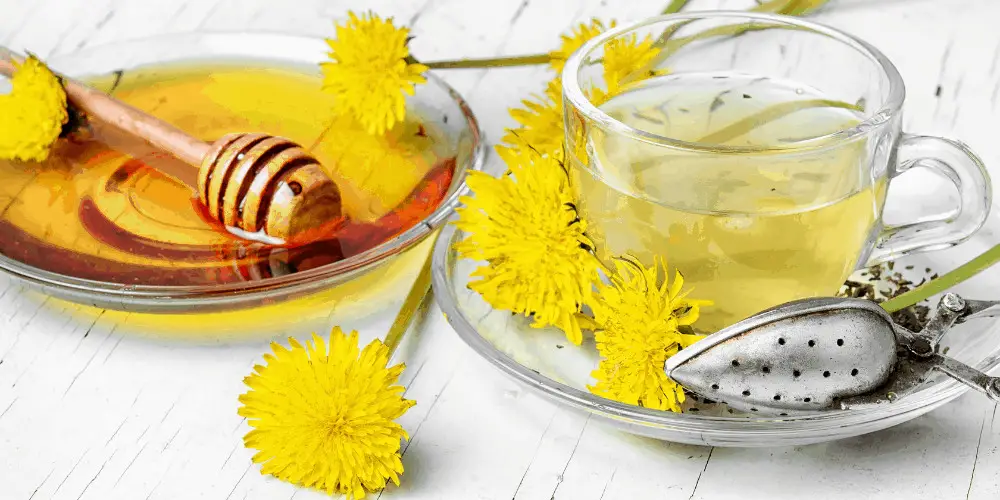
Most people think of dandelions as being unpleasant weeds which sprout in their yard, but they pack a powerful punch when it comes to preserving your health as well. Dandelion tea, which can be made from either the leaves or the flower, offers a whole host of benefits, including (but certainly not limited to) bowel function.
Although there’s not an abundance of research to support this claim, anecdotal evidence suggests that dandelion tea can help relieve constipation and other minor digestive issues. Dandelion tea is considered safe for consumption in moderate amounts but should be avoided in anyone with an allergy. Dandelion does interact with certain medications, so it is important to alert your physician before making this a regular part of your routine. The taste of this tea will vary depending on which part of the plant is used; using the flower petals will result in a sweet and delicate taste, while the leaves will result in an earthy, herbal flavor.
Peppermint tea
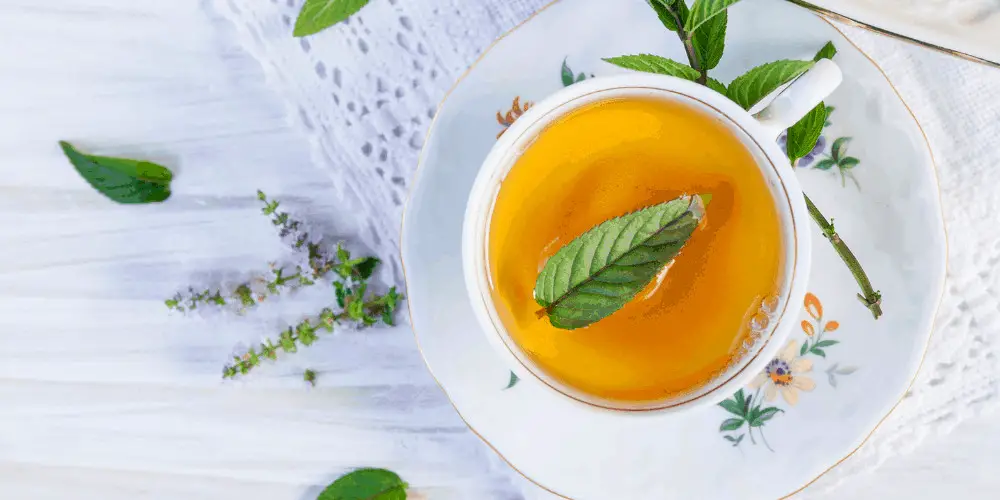
Peppermint tea is known for its delicious flavor; however, it brings quite a few health benefits to the table as well. It is among the teas that have been touted as a natural way to relieve constipation.
Although the research to support this is a little lacking, one study which evaluated peppermint in combination with other ingredients did identify an improvement in constipation in those patients in the experimental group.
Additionally, anecdotal evidence supports its effectiveness in treating constipation in addition to bloating and upset stomach. Some research has also suggested that peppermint tea may be effective in treating the symptoms of IBS by helping to relax the muscles within the digestive system. Peppermint tea is generally considered safe for people of all ages to consume regularly; however, those with a history of heartburn or reflux should use caution as peppermint tea may exacerbate these symptoms.
Cascara tea
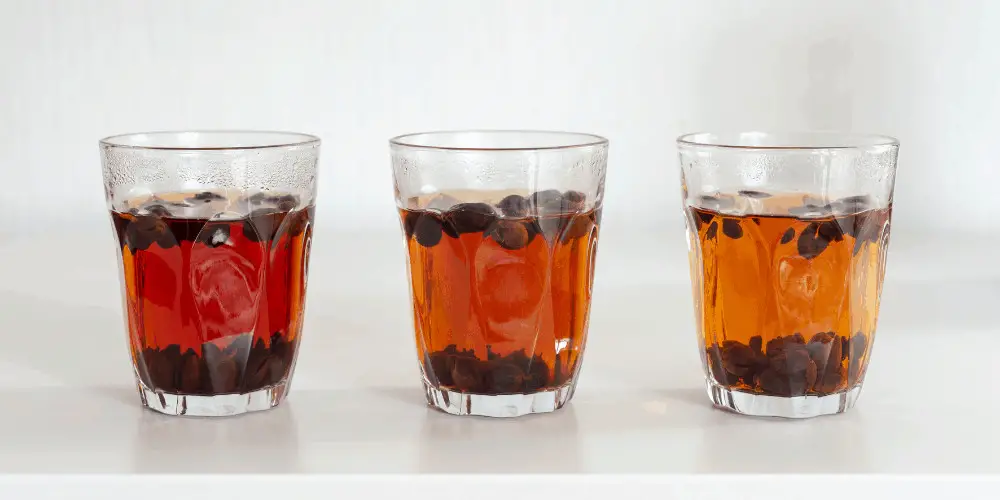
Cascara is a lesser-known tea, with fewer people opting to consume this tea likely in part due to its very bitter flavor. Its bitterness, however, maybe what makes it beneficial in treating constipation and other issues related to the digestive system.
Although research on this topic is limited, cascara has been widely used to treat constipation for quite some time and the anecdotal evidence to support its effectiveness is pretty strong. The active compounds found in cascara help stimulate muscle contractions within the gastrointestinal tract, resulting in increased peristalsis and more regular bowel movements.
Because this herb can have a strong laxative effect, it is recommended that you consume this tea in moderate amounts and avoid long-term use. This tea should be avoided in pregnant women and children under the age of 12, along with anyone that suffers from inflammatory bowel disease or kidney disease. Please consult with your physician before adding cascara tea to your regimen for constipation.
Wait, what about…?
You may find yourself saying “wait, I heard _____ tea was good for constipation…” A few other teas, including black tea and licorice root tea, have been suggested to be good for constipation.
In reviewing available literature, the jury is split regarding black tea. While some have inferred that its relatively high caffeine content causes a mild laxative effect, others have suggested that black tea may actually cause constipation.
A study published by the British Journal of Nutrition failed to identify any changes in bowel habits between the experimental group, who consumed six cups of black tea per day, and the control group.
Licorice root tea seems to only work for constipation when combined with other herbs; it is commonly used in combination with senna as it helps increase its effectiveness.
Consider Adding These Ingredients For Further Benefit:
- Lemon – Lemons and lemon juice have been suggested to help with constipation relief as well. Their high vitamin C content helps pull water into the GI tract, which can result in softer stool and more regular bowel movements. Consider adding a bit of fresh lemon to your tea to help further boost its laxative properties as well as add a bit more flavor!
- Honey or molasses – Several studies, conducted in animals and humans, have identified honey and molasses as having laxative properties. The laxative effect of honey is thought to be attributed to incomplete fructose digestion. One study, conducted in pediatric patients aged 4-12, suggested that blackstrap molasses syrup may be as effective as polyethylene glycol in treating functional constipation. It is recommended that honey and molasses both be avoided in children less than 2 years of age due to the risk of infant botulism; they are considered safe for children and adults. Not to mention, they can help add a delicious, sweet flavor to help offset the bitterness of some of the teas.
Conclusion
In summary, any of the above teas for constipation would be worth a try if you’re someone that battles constipation on a regular basis. We recommend that teas be added as a second line of defense only if you have failed to see improvement after implementing changes to your diet and lifestyle (ensuring adequate fluid intake, upping your physical activity, and veggie intake). Make sure to consume these in moderation and with the consent of your doctor.
There are other drinks that can help with constipation. For one, water (with or without lemon!) is a great choice for anyone suffering from constipation. Other beverages that may help with constipation include prune juice, coffee, apple juice, and pear juice. We recommend that you consume these in moderation and keep an eye on the sugar content as many of these juices contain large amounts of added sugars.



